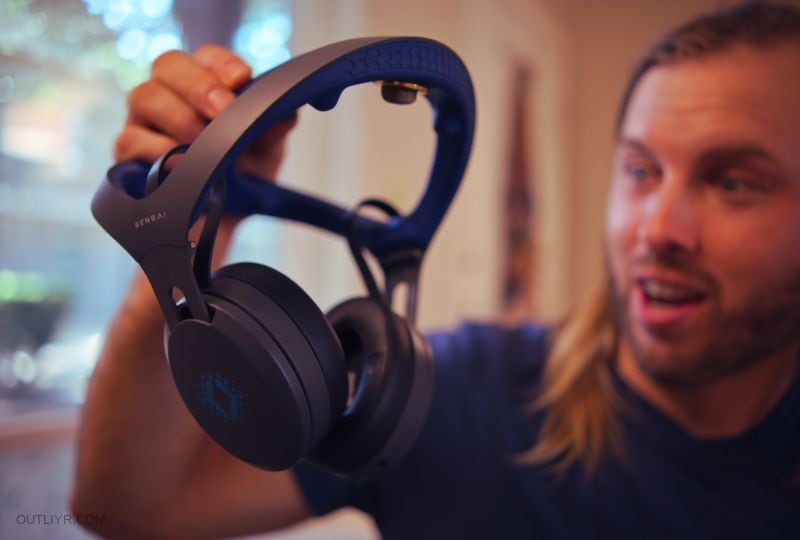“That’ll be $100,000, please.”
Around the world, behind closed doors, professional athletes, elite military personnel, biohackers, and Fortune 100 executives go into special brain re-training facilities. Giving them an unfair advantage towards reach their full potential.
Peak performers thrive under pressure. They consistently make better decisions, faster, and reliably access the “flow state”. Top performers live better and more satisfying lives.
They have a trick up their sleeves…
A powerful yet little-known technology called neurofeedback. One session can cost as much as $1,500. A complete training package can cost up to $100,000. Plus, days spent traveling to the nearest clinic.
Why go through all this hassle?
Our dopamine-fueled modern lifestyle hijacks our brains and takes us out of control. Algorithms, apps, and products covertly control us. Our mind, our thinking, and the way we feel.
Training our brain protects our mind, re-wires our brain into an optimal state, and gives us a massive advantage.
Here’s the best part…
I came across a brand-new, state-of-the-art neurofeedback system that provides clinical-grade brain training. It contains the equivalent of 5 wearables all within one device. Unlimited at-home brain training for less than the price of one neurofeedback session.
Based on your goals and real-time biometrics, their concierge adapts each Program and Mission to suit your needs precisely.
I pre-ordered the Sens.ai Neurofeedback Headset years ago. I’ve finally gotten the chance to test it thoroughly. This is my honest review of the Sens.ai Brain Training System, the science behind it, and my personal experience over 300 sessions later.
By the end, you’ll know how this stacks up to the alternatives and whether it’s right for you.
In a hurry? Check it out now…
What is Sens.ai?
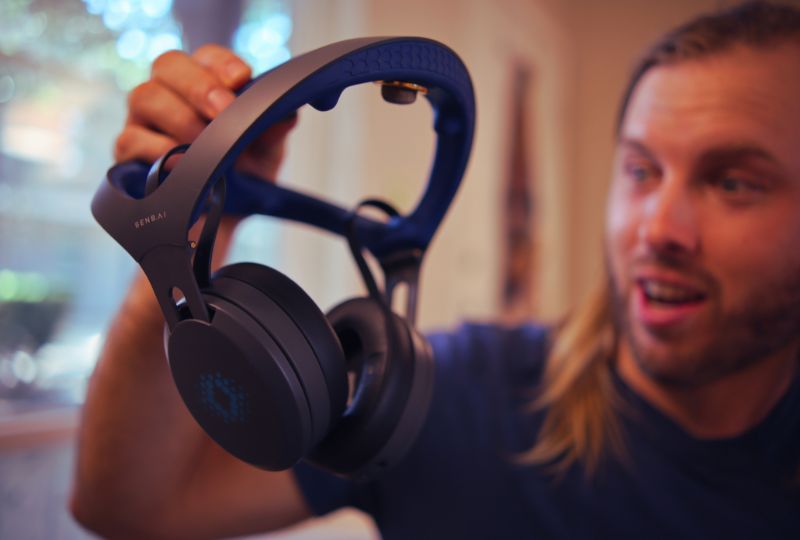
Sens.ai is the company behind the latest and most advanced neurofeedback device.
Frustrated by the lack of quality products available to consumers, and the typical inconvenient hurdles required by the technology, Sens.ai CEO Paola & team set out to design the world’s best at-home brain training platform. The Sens.ai team includes some of the most decorated neuroscientists and neurofeedback experts.
Unlike other devices, this flagship product contains several breakthrough technologies:
- Custom Engineered Headset: Built with quality materials, the comfortable one-size-fits-all device includes pioneering electronics and state-of-the-art software
- Proprietary Neuro Sensors: Three custom EEG sensors within the headset gauge beta, alpha, theta, and a wide range of gamma brainwaves. Without requiring you to apply the messy paste to your hair
- Functional Brain Testing: Their GeniusPulse™ uses a game to quantify your brain’s current performance. Showing your long-term progress. Since it contains clinical-grade sensors, I imagine they’ll build out brain biological age testing eventually.
Best of all, the app gamifies sessions. Making them actually fun and following an optional storyline.
And it’s so much more than neurofeedback.
Sens.ai combines five brain training technologies all in one:
- Medical-grade neurofeedback
- Powerful light stimulation (transcranial photobiomodulation)
- Heart coherence (HRV) biofeedback
- Brain function assessment
- Advanced meditation training
Unlike meditation, there’s no struggle to quiet your mind. No feeling like you’re laboring or doing mental chores.
Whether you’re looking for mental clarity, intense focus, deep relaxation, cognitive resilience, or to replace questionable therapeutics you’re currently using, this is the true holistic brain training platform.
Neurofeedback explained simply
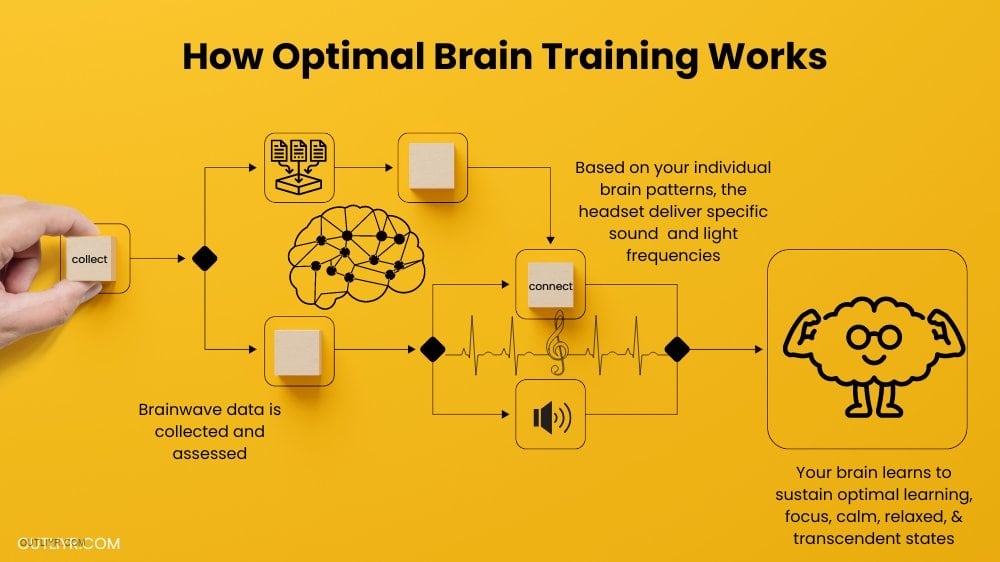
Neurofeedback is a form of brain training that improves our brainwave activity. In reaction to our thoughts and lifestyle changes, the brain fires different electrical impulses. Resulting in the states we’re all familiar with (deep sleep, focus, creativity, stress, relaxation, etc).
Neurofeedback trains your mind to enter and sustain desirable states on command.
Using special sensors, neurofeedback systems quantify your brainwaves. When your brain enters beneficial states, the tech uses an external cue (visual or auditory) to reward the change. When you slip back into unfavorable brainwaves, the cue disappears.
With practice, you learn to control your brainwaves and thus, how you feel and perform. Making it easy to feel:
- Focused
- Relaxed
- Sharp
- Rejuvenated
- Calm
Using this technology, you can teach yourself how to enter and maintain the peak performance gamma brainwave state. The same coveted “flow state” accessed by geniuses, lifelong Zen masters, professional athletes, and other high-performers.
You control your state. Feeling what you want, when you want.
The key differentiator responsible for the success of the world’s elite is their brain health and function, two factors anyone can improve with the right tools Share on X
To learn more, check out my posts on the science and benefits of neurofeedback, as well as my favorite brain training systems.
I’ve used several neurofeedback systems. Sens.ai does everything they do, and a lot more.
Potential Benefits & Use Cases
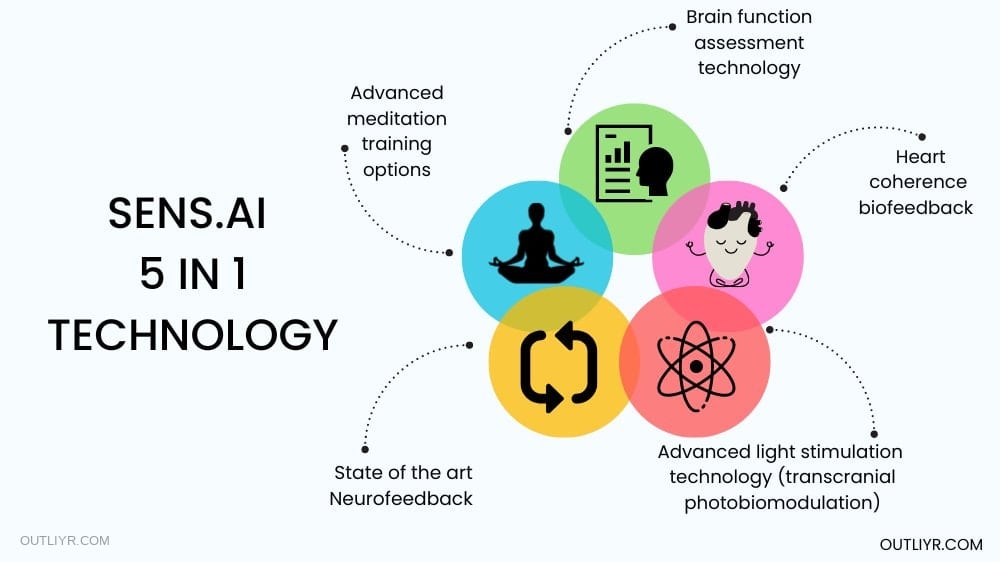
Sens.ai is currently designing clinical trials to prove the efficacy of this specific system. However, the fundamental technologies within the headset include well-studied modalities like neurofeedback, light stimulation (transcranial photobiomodulation), and heart rate variability (HRV) training.
At its core, this technology grants us control over our mental state. Our mind forms our identity, beliefs, thoughts, emotions, and feelings.
Thus, by choosing our desired brain state, we gain control over every facet of our holistic health and performance.
So the applications use, and therapeutic potential of Sens.ai is nearly limitless.
Users of advanced neurofeedback modalities report wide-ranging effects. Some of which I’ve listed below.
Sens.ai brain training can improve:
- Sleep
- Stress
- Focus & concentration
- Relaxation
- Clarity
- Memory
- Learning
- Introspection
These are the general benefits.
And it’s quickly becoming popular for countless specific use cases.
People use brain training to enhance:
- Gaming
- e-Sports
- Sports
- Programming
- Military excellence
- Easing addictions
- Socialization
- Public speaking
- Acting
- Singing & performing
- Post-brain injury (concussion/TBI)
- Writing
- Meditation
- Art
- Teaching
- Studying
Any occupation or activity that involves the mind (including coordination).
In fact, I’ve talked to several people who used brain training to taper off medications gradually . Of course, always talk to your doctor first before changing your lifestyle or medication regimen.
Nevertheless, the versatility and power of brain training are astounding.
Clinically proven neurofeedback should be part of the school curriculum and the benefits package of every workplace.
For a thorough list, check out the post I wrote on the science and benefits of neurofeedback brain training, or listen to my Podcast review.
Best of all, Sens.ai is much more than neurofeedback.
Use the Sensai promo code URBAN to save 5%
How Sens.ai Works
Sens.ai is a full suite of brain-enhancing tools, comprising both hardware and software.
It has a bit of a learning curve but becomes simple after several sessions.
The headset is the primary hardware you’ll use, and the “brains” of the system. It’s required for every use. You can use the Genius Controller occasionally (in tandem with the headset) to quantify and assess your brain functioning.
Setup
After charging both the headset and GeniusPulse (which took me about 30 minutes), the first step is to download the app and follow the on-screen instructions. It’ll have you pair the headset via BlueTooth twice. Once for the sensors, and once for the audio.
Then you wet the sensors with a few drops of water using the provided tube.
From there, you’re ready to open the app.
App
The developers did a great job thinking through the app. Both the UI, the AI-powered assistant, and the storyline that runs through each session.
I found this software to be self-explanatory, elegant, and fun to use. You don’t need to understand brainwave science to reap the benefits. You have the option to either follow the mission story arc or skip it and go straight into training.
The main tabs within the Sens.ai app include:
The latter three are different modes. More on each of them shortly.
Connect
Before every session, a pop-up prompts you to share your current state. You adjust sliders for your levels of calm, focus, energy, and happiness. I take about ten seconds to answer.
Finally, you wear the headset and push the ear pads to contour it to your scalp perfectly. Make sure all three sensors touch your head. It’ll require you to sit still to get a high-fidelity signal lock. Ensuring you get accurate biofeedback (and thus the best results).
From opening the app to getting my session takes between 20 seconds to about two minutes, depending on my environment. Non-native electromagnetic fields can interfere with sensitive sensors. If you have issues getting a signal lock, try moving to a different area.
You repeat this process for every session.
If you’re using the GeniusPulse brain assessment tool, you’ll also plug the provided cord into the headset’s 3.5mm jack. After clicking through a few screens, you’re ready.
Begin
The sessions themselves vary based on the type and chosen duration.
You can select between heart rate coherence (HRV biofeedback) training, or classic neurofeedback. They designed some programs to be used with visual cues, while others you do with your eyes closed.
Throughout the sessions, you must remain sitting upright and fairly stationary for the sensors to read and adjust the program to your brainwaves accurately. If you move too much, the program pauses until you regain a high-quality signal.
At the end of your session, you’ll get a prompt asking you to check in and adjust several sliders to rate your new mental state.
All the while, Sens.ai helped you train and recorded your biometrics in the background. After training, you then see these stats and can compare them as you use the device more.
The Three Core Sens.ai Modes
Sens.ai is the first holistic brain training kit I’ve discovered. Although they also offer heart rate variability coherence training, it’s centered on brainwave biofeedback.
The three Sens.ai modes include:
Each of these modes is traditionally one separate device. Sometimes, as with the Train mode, multiple separate systems.
Assess (GeniusPulse)
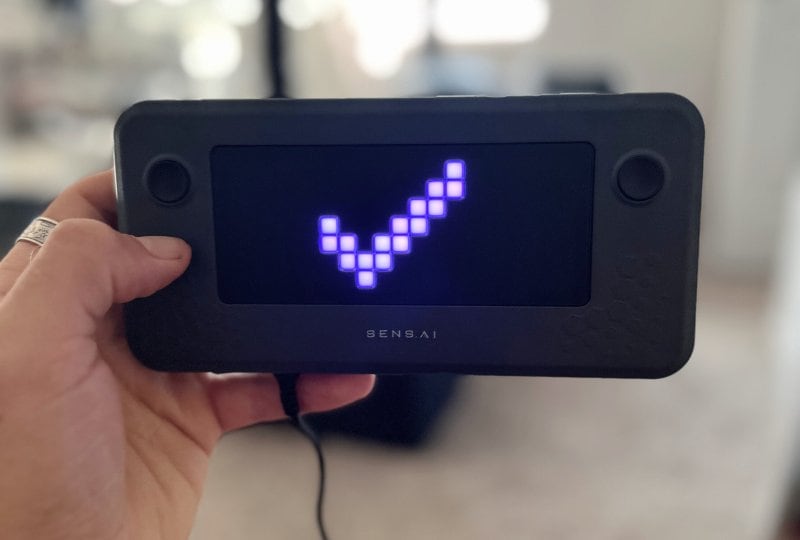
Assess uses the GeniusPulse add-on to quantify your brain’s current performance. While you play a simple game, it measures a suite of brain biomarkers.
This is huge. If they even track it, most systems only report a few metrics regarding your neurofeedback session. You can compare sessions, but what does that ultimately do?
GeniusPulse translates your progress into demonstrable improvements to the cognitive biomarkers that actually matter, such as:
- Speed of thinking
- Working memory
- Reaction time
- Accuracy
- Error correction
- Impulse control
And more.
Behind the scenes, they use mathematical measurements called Event-Related Potentials (ERPs) to measure the brain’s performance. Faster speeds equate to greater power. Clinicians use this same technology in their peer-reviewed research.
ERP components like P300, for example, is a biomarker for academic achievement. It reflects attentional processes involved in stimulus evaluation and inhibition control [R].
The game itself takes 15 minutes. And, honestly, it’s not the most fun. Basically, shapes flash onto the screen and you identify them as fast as possible.
The difficulty varies, and after about 10 minutes, I feel like I’ve entered a trance state.
I recommend using Assess before your first session and after every two weeks of training. You should start seeing significant changes after about 10 brain training sessions.
If you’re not accustomed to brain training, take a break between assessment and training.
Train (improve)
Train is the bread and butter of the system. This is where Sens.ai measures your real-time biomarkers (brainwaves or heart coherence), and gives you real-time cues to rewire your brain.
The two key technologies behind Train include:
- HRV biofeedback
- Neurofeedback
Unlike most other HRV biofeedback devices available, Sens.ai finds your resonant frequency breath rate. This is the optimal inhalation and exhalation cadence that, when followed, re-balances your unique nervous system.
HRV training is foundational and easier to control and improve than neurofeedback. Thus, it’s the first program available to new users.
Only once you’ve completed a Heart Coherence session do you unlock their clinically-developed neurofeedback.
There are different neurofeedback training programs to train specific brain states (and brainwaves). Everyone starts with Calm, but then you can move on to Focus or others.
Boost (stimulate)
The mind is sensitive to external forces. Whether via light or sound, it will match the frequency of the applied force.
Neurofeedback provides long-lasting and long-term benefits. The effects take multiple sessions to build up. Even more to notice.
Boost does exactly what its name implies: it enhances brain function. It provides special light energy to the brain via transcranial photobiomodulation (tPBM).
Within about 10-minutes, Sens.ai boost elevates:
- Brain function
- Concentration
- Mood
This light stimulates your mitochondrial function within brain cells, improving cellular oxygenation and energy production.
Throughout the session, it adapts its intensity and output based on your brainwave patterns. Ensuring you enter an ideal state every time.
With neurostimulation, more is not better. Optimal is better.
That’s what sets it apart…
Personalization.
Boost uses near-infrared light to stimulate specific locations on the brain at your optimal frequency. Using your personalized frequency and power level elicits your ideal state change. Without side effects.
The app contains several Boost modes:
- Snooze (Transcendium): Relax & prep for bed
- Chill (Resilium): Calm and clear relaxation that’s great for unwinding
- Prepare (Resilium): Prime for relaxed productivity
- Expand (Cognizium): Uplifting boost for peak performance
I use Expand to induce apex states instantaneously. It’s a great pre-event. Whether sports, public speaking, work, etc.
My Experience With Sens.ai Brain Training
Since receiving my full Sens.ai kit many months ago, the entire process has impressed me. Enough that I bring it with me traveling.
From the sleek, Apple-like unboxing, to the easy-to-navigate app, to the measurable improvements I’ve gained through training.
You can easily customize session details. Such as the total duration, the background soundtrack, or the chimes.
You can chain together the different training forms into one session. I often do HRV biofeedback and then immediately launch into a Focus neurofeedback session.
And I expect their software to only improve as we provide feedback.
Mission
The app follows an engaging storyline that involves mining for rare minerals to heal your imaginary planet.
Each brain state corresponds to a different mineral.
Every time you complete a training session, your stores of a particular mineral increase. This ensures that you don’t skip the fundamentals and instead balance and optimize your training.
The general training regiment comprises eight weeks of a guided training program.
You can choose to follow it (and level up your character) or choose your own adventure. I’m currently at Level 15.
At the end of each chapter, the storyline progresses, and your current objectives change. They recommend logging a GeniusPulse brain function assessment before and after the mission to show your improvements.
After eight weeks of establishing a healthy neurofeedback foundation, you unlock missions that cater to specific goals:
- Peak Performance
- Ultimate Resilience
- Calm You
- Sustainable Performance
- Sleep Nirvana
- Sharp Mind
- Clear Mind
After mastering these, you then can access the next level of missions.
Sens.ai’s advanced missions include:
- Brain Upgrade
- Expanded Awareness
- Attention Mastery
- Freedom Now
- Monk’s Mind
- Deep Creativity
- Ultimate Performance
- Still Mind
- True Nature
- Deep Dive
I’ve found it fun and engaging. Since I got my headset, I’ve worked through about 3/4 of the missions so far.
Although it’s not perfectly clear which trainings count towards the current mission, and which do not.
Brainwaves
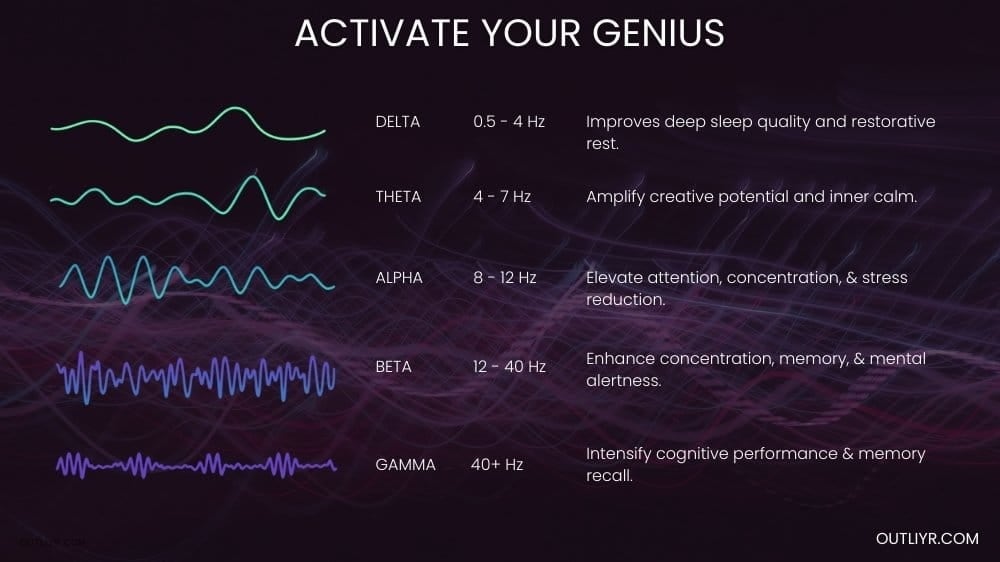
Whether you target relaxation, focus, sleep, or performance, each state corresponds to a particular brainwave pattern.
Most neurofeedback systems train just one brainwave. Usually Alpha, but sometimes Theta too.
Very few do multiple.
Instead of only training specific brainwave frequency bands, this platform focuses on functional outcomes.
With Sens.ai, you build a fountain of resiliency via training Alpha and Beta brainwaves, along with HRV. Eventually, you layer on Gamma and Theta training on top. Resulting in unique and functional brainwave combinations.
Every program throughout the app displays which minerals you’re gathering from training. For the science-minded, you can interpret the minerals as brainwaves.
Minerals correspond to Sens.ai’s brainwave target frequency bands (from fastest to slowest):
- Cognizium: Gamma/Beta
- Resilium: Alpha
- Transcendium: Theta
You’ll also see icons for Synchrony and Harmonium in the sessions information. These, however, are not minerals.
As you progress through the missions, you learn to synchronize alpha, gamma, and theta simultaneously. Bringing you into what they call the “ultimate integrated brain state”.
Unlike neurofeedback, which trains narrow bands of specific brainwaves, the Sens.ai adaptive system trains you to accomplish real-world outcomes.
Modes
I’ve mostly used Calm Heart (HRV), Calm, Focus, and Intense Focus. To socialize or prepare for sleep, I sometimes use Deep Calm instead.
Calm Heart is a form of HRV biofeedback training. The pulse oximeter on the headset’s ear cup quantifies heart rate variability in real time. I’ve done this form of training with other devices.
Calm Heart easily and quickly shifts my state. In fact, I’d say it’s the most time-efficient stress relieving, and resilience-building biohack I’ve encountered. After just seven minutes (the shortest duration available), I feel an unshakeable calmness. Nothing can throw me off my game.
Calm. So far, I’ve found the Calm sessions more difficult. My first nine sessions yielded embarrassingly low scores. Around session ten, something shifted. I can now more reliably enter this relaxed state. By the time the session ends, I feel noticeably different. More grounded and centered. I feel levelheaded and ready to approach my work. Better resourced to show up as my best self in my relationships too.
Calm has become my bread and butter. Most days, I like to stack a Calm neurofeedback session with 7 minutes of Calm Heart first as a “primer”. The results some of the most potent anxiolytic substances I’ve tried.
Deep Calm. The description compares this Mode to the effects of wine—serene and tranquilizing. I rarely like using any technology late at night. So I don’t use this mode as often as the others. Compared to Calm, I have an easier time scoring high, and I find the post-training effects quite powerful. At the end of the session, I felt completely open and ready to sleep.
It provided the social lubricating effects of alcohol, along with the drowsiness. According to my Oura ring wearable, this also improves both my sleep quality and quantity scores. Deep Calm works great to help combat jet lag too.
Although I purchased this headset mainly to train gamma brainwaves, I now realize that my focus (and this mode) needs the least improvement.
Focus. To my surprise, I had zero trouble with Focus mode. The first time I did it, I already got into a hot streak. I found my ability here much more satisfying (but probably less needed). I noticed little difference between Focus and Intense Focus. After each, I felt alert and ready to go.
Intense Focus. Similar to the feeling I get after a really motivational pep talk. Having only completed half a dozen sessions with this mode, I already see the benefits of translating into my work. I notice greater mental endurance and the ability to tune out distractions. This one is great for productivity and getting work done. They compare it to coffee.
As you progress, after about 100 sessions, I unlocked three other neurofeedback training modes.
Clarity. Described as the solution to connecting ideas and discovering new patterns. Like the focus modes, I found this one pleasantly stimulating. I feel decently energized after each session, but without the tunnel vision caused by coffee and other stimulants.
As a multiple-hat-wearing business person, content creator, and data scientist, of the stimulating sessions, so far I prefer this one.
Concentration. The name describes its use case best. This one is great for focusing on one single thing and tuning out everything else. In other words, for dropping into the flow state. Although in a more introspective fashion. I found this one most helpful to cultivate emotional health/presence.
Introspection. This is the one to rapidly change behaviors, re-wire subconscious memories, shed limiting beliefs, and to master introspection. I find it particularly calming but also slightly energizing. Introspection has become one of my favorites.
Then, once you have about 200 sessions under your belt, you unlock three more neurofeedback trainings.
Brightening. One of the stronger energizing trainings, Sensai describes brightening as causing a “nootropic-like effect”. Or, bringing the world into high-definition. This is another one that can replace coffee. If you’re looking to clear brain fog, Brightening is the session for you.
Mindfulness unlocks with the Monk’s Mind mission. This is classic theta brainwave training and replicates the state that advanced meditators enter (and sustain). As you may suspect, it pairs perfectly with mindfulness meditations.
The mission I’m currently completing has me doing Mindfulness sessions most days. I find these sessions quite easy and less engaging than the others.
Insight. Although I unlocked this one, I have yet to train it. Insight’s supposed to support creative, lateral thinking. To improve complex problem solving. I plan to train Insight as soon as I finish Monk’s Mind.
Neurostimulation
I own several brain-boosting technologies.
Including…
A tACS device that applies micro-currents of electricity to the head.
Neuroacoustic software like Brain.fm (read my review) and NuCalm (my review) entrain specific brain frequencies. I’ve used other powerful neural entrainment technologies like Braintap too.
And a bunch of others.
Aside from the audio, I don’t use most devices. They simply don’t customize the treatment to my neurochemistry.
I often tack on a Boost after my main training session. I mostly use Expand or Drive to enter a gamma brainwave dominant state and to get my best work done.
Again, like the other modes, Sensai customizes the neurostimulation to match exactly what your brain needs.
For example, my last Expand Boost session used a 41.0Hz Personalized Boost Frequency. This is a measure of the number of light flashes per second that my brain resonated best with (in the gamma band).
Afterward, I felt a similar mental buzzing to drinking about a half cup of coffee. Only cleaner and more translatable into my work.
Expand mode usually lasts me around four hours. But it doesn’t have the same crash of caffeine either.
I can use this Boost until about 7 PM, and if I do Expand any later, it will noticeably interfere with my 10 PM sleep time.
I don’t use the others very often, but I plan on experimenting more with the Prepare Boost too.
Honest Review of The Sens.ai Brain Optimization Platform
Although it hasn’t been perfect. I haven seen no other honest Sens.ai reviews, so I wanted to share my full experience so far.
Everything I love about the platform, and the areas I hope they improve.
Sens.ai Review: The Pros
A number of things stood out to me, which is why I pre-ordered and paid for the system nearly 15 months before receiving it.
5-in-1. There are lots of great neurofeedback systems available. Yet none combine five different modalities into one. I couldn’t even find another that combined three. The convenience and integration of everything into one were among the top reasons I chose Sens.ai over the alternatives.
Data. Data lovers will adore this tool. I can see how my brain performance stats change after each session and compare it to my historical trends. I can use the GeniusPulse at any time to quantify how other health modalities, nootropics, and supplements impact a thorough suite of brain function biomarkers. Or even as a baseline benchmark in case I sustain a brain injury in the future.
Accuracy. Another key differentiator between Sens.ai and the alternatives comes down to the quality of the signal (signal fidelity). Few consumer systems measure with the same precision. When measuring something as intricate as brainwaves, the signal quality makes all the difference. In fact, if electrosmog in your current location interferes with the signal, this system prompts you to physically move elsewhere before training. Better signal, better outcomes.
Gel-free. Neurofeedback requires extremely precise signal sensing to gauge brainwaves accurately. Virtually every other EEG-based system requires the user to lather gel into the hair before every single session. This makes daily or semi-daily neurofeedback a major pain, especially for those with long hair.
Gamification. This gamifies the future of health, borrowing the same model as other addictive technologies (say, social media). The best way to establish a new habit is to make it fun and rewarding. This system makes brain training fun and exciting. I know a ton of people with brain sensors and neurofeedback systems. Most stop using them because it feels like a chore. Not Sens.ai.
Hardware. I find the build quality and thought that went into the hardware design impressive. The headset itself is comfortable and one size fits all. Yet it’s also loaded with state-of-the-art sensors and technologies. And all things considered, it doesn’t look atrocious.
App. The development team did a great job with the app layout. From making brain training accessible to audiences of any background to thinking through the ideal progression of missions. They pair each training with soothing soundscapes, and sometimes, visuals. All the instructions are explicit, concise, and easy to understand.
Diversity. Right now, Sens.ai offers 12+ different programs. You can follow an eight-week progression that takes you through 16 missions. It’s a brand-new device and company, so I imagine they’ll add more over time too.
Battery. When using my headset for about 30 minutes per day, I get a full week of usage before I must recharge the battery. Convenient for traveling. The unit recharges within about an hour too. Although for some reason, it doesn’t let me start missions when I dip under 27% battery.
Value. The price is certainly high (in the cons below too), but what you get is unparalleled. No other brain training system offers as much for the price. Compared to in-clinic neurofeedback, Sens.ai pays for itself in just a session or two.
Sens.ai Review: The Cons
This is a brand-new device, and I own one of the first available to consumers.
As expected, Sens.ai has some kinks to work out. Some of these criticisms are limitation of the neurofeedback technology itself rather than their platform.
Price. There’s no avoiding it. This device costs north of $1,000 which is almost a deal breaker for me. I also may have missed or forgotten about this. Disclaimer. After the first year, you’ll need a membership to access your data. I believe it’s around $240. $20 per month isn’t insane, and likely funds future developments, but it still adds up.
Sensor wetting. Every EEG-based neurofeedback system requires conductivity. As do most electricity-based medical devices. While it’s an amazing improvement that this one doesn’t require applying gel to the hair before every session, users still need to wet the sensors (with water). The process takes about 30 seconds.
Signal lock. I immediately noticed that getting an accurate signal lock can take some time and patience. You can’t sit too close to any large electrical devices, sit outside in any wind, or move too much. If you do, Sens.ai will take forever to acquire a signal and easily disconnect.
Placement. If you have long hair, it takes longer to connect. You can make it faster by manually clearing some hair around the sensors so they directly contact the scalp. You’ll also need to sit up straight and not move much throughout the session. If you move too much, the program will pause until you regain a clear signal.
Internet required. I wanted to do a few neurofeedback sessions while I was on the road traveling. I quickly discovered that the app requires the internet to function. This is strange because the first time I do a program I see a progress bar mentioning that it’s “downloading assets”. So it should be available offline, and I imagine they’ll fix this soon.
Sharing. As much as I love this technology, they clearly designed it for individual usage. If you plan on sharing with others, they must get their own membership. If they use your account, their data will merge with your own and render the data meaningless.
Mission progress. According to their CEO, Paola, each user progresses dynamically through missions. Since there was no preset mission sequence, I found it difficult to know if everything was working right. I’d like more information about my current mission and the motivation of knowing what I’ll unlock in the next mission.
Meeting deadlines. I pre-ordered expecting that my unit would arrive within 2 quarters (according to their roadmap). They publicly announced a Q3 2022 launch. When there were global parts shortages, we backers didn’t receive timely information regarding the status of our orders. The arrival date kept getting pushed and pushed at the last minute. Then again, this is a brand new company and they’ve now ironed out both inventory and manufacturing process. Since you’re reading this now, you shouldn’t face any of these issues.
To me, the pros of Sens.ai dramatically outweigh the cons. Anyway, most of the cons I’m listing should be easy fixes or are already no longer issues.
Sens.ai Pricing
Neurofeedback is an expensive technology. It requires incredibly sensitive sensors and a means of providing feedback cues.
Then there’s conveying that data to the public. To actually understand your session. All of this requires tremendous R&D, and then the cost of state-of-the-art parts plus labor.
Sens.ai brain training headsets cost $1,500.
The first year of use is complimentary. After that, there’s an optional $240 per year membership fee to access your data. The device still functions without membership though.
Although it sucks to pay a subscription on top of a ~$1,400 system, when you do the math it still comes out quite cost-effective.
Unlimited use of the entire Sens.ai kit plus three years of premium membership still costs less than one or two in-clinic neurofeedback sessions.
And you don’t have any of the time, transportation, opportunity cost, or other hassles of clearing your schedule for professional neurofeedback.
Plus, this one system renders four other wearables I own obsolete.
Sens.ai Headset Alternatives
I haven’t found any other devices that are direct competitors. Everything else lacks multiple features/programs/modes.
Sens.ai sets itself apart from these other neurofeedback devices via:
- Comprehensive System: Sens.ai is a 5-in-1 Brain Training System that encompasses multiple cognitive enhancement techniques in one platform. Long-term results via neurofeedback, immediate results via neuro-light therapy and heart coherence training, and quantification technology to prove the benefits. Traditional neurofeedback devices focus on a single aspect of brain training. This is a comprehensive solution.
- Customizability: Sens.ai allows precise personalization of training programs to address specific needs and goals. Then, it uses your real-time data to customize other modes (like stimulation) to your particular needs. It also employs continuous signal quality monitoring and adaptive neurostimulation for better training integrity and flexibility.
- Accessibility: Sens.ai is portable, easy to use, and convenient. There are no wires, gels, or complicated parts. All you need is the internet and a few drops of water. Virtually any age and skill level can use the system. Making regular brain training a low-friction habit to adopt.
- User Experience: Sens.ai creates a user-friendly experience. The platform uses gamification to make brain training addictive. The intuitive app interfaces, progress tracking, detailed session biometrics, and the plethora of training options keep the process engaging.
- Holistic Approach: By combining cognitive enhancement, memory improvement, focus enhancement, relaxation, and stress reduction techniques, Sens.ai holistically trains the brain. Offering a more well-rounded solution compared to virtually every other device that targets only one area or brainwave pattern.
But you may want something more affordable that only does one of the five modalities.
Those on a budget can start brain training with these Sens.ai alternatives:
But if you add these technologies together, you get more devices, more expensive memberships, siloed data, and a much larger total price.
How to Amplify Your Brain Training Results
Every respected neuroscientist agrees on the value of core health practices for cognitive function.
To improve your brain, you should work on your:
- Sleep
- Nutrition
- Hydration
- Movement
- Stress management
These are the fundamentals.
I also recommend engaging in some new, novel activities or situations. All of this works synergistically with brain training.
For the advanced, I like to add in some high-quality nootropics. Like:
Or even neuropeptides like Dihexa and Cerebrolysin.
The right products combined with neurofeedback can help the brain rewire, grow, and form new connections. Resulting in faster and stronger benefits.
Outliyr Brain Training Protocol
So how am I personally using this to get the best results, fast?
Here’s my current Sens.ai brain training protocol:
I repeat this Monday through Friday and take the weekends off. After a few weeks, I will drop the cerebrolysin and continue.
Since neurofeedback can be quite taxing, you’ll also want to use these same strategies to fully optimize your recovery protocol.
Supercharging Your Brain With Sens.ai Brain Training
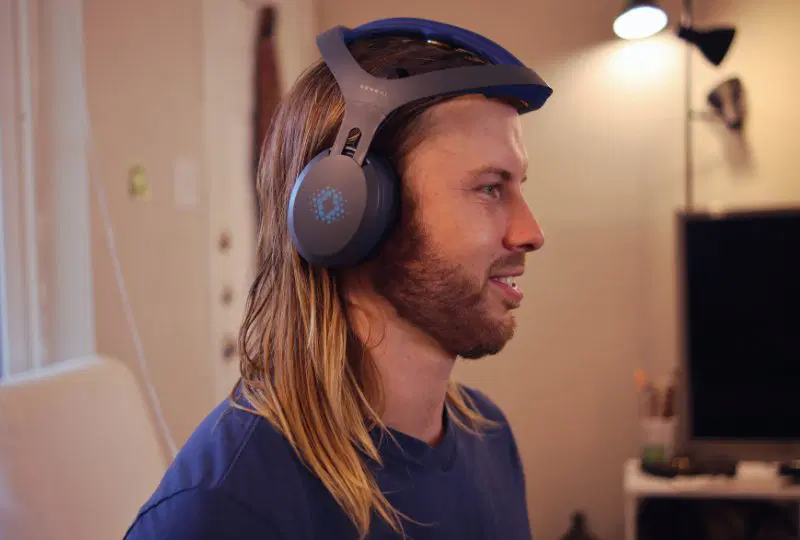
Your mind largely determines the rest of your reality.
Your identity, beliefs, thoughts, emotions, feelings, and actions all stem from your brain.
Yet humans haven’t had the tools to monitor and troubleshoot the inevitable brain inefficiencies or glitches that accumulate from living.
Especially in a dopamine-driven, technology-first world, specifically engineered to take control of your mind.
Brain training is an antidote to this global and growing issue.
By using sensors to monitor brainwaves, we’re able to give the brain gentle cues to help it improve its ability to self-regulate. With practice, it learns to enter and maintain ideal states.
Your mind becomes more resilient, and you take control of the lead domino dictating your life.
Sens.ai is like a mirror for your mind, helping you address areas that need the most work Share on X
You learn to:
- Easily focus for hours without distraction
- Sleep deeper, faster, and more efficiently
- Stay relaxed and smooth in high-stakes situations
- Live in your unique “zone of genius”, a state that takes most people 10,000+ hours to reach
- Control the “uncontrollable” states of mind
- Physically and mentally dominate
- Sustain your high-performance
Until recently, you had two choices to achieve this.
Affordable yet weak at-home systems that don’t do much. Or a complete professional neurofeedback package often costing north of $100,000. Even more to add the other modalities too.
I’ve tried many neurotech apps, devices, and systems, and this is the best I’ve encountered. It certainly has its flaws (mentioned above), but Sens.ai is leagues ahead of everything else.
In fact, this all-in-one system has features usually contained within five separate wearables.
Other neurofeedback devices train narrow ranges of brainwave frequencies. Sensai’s adaptive system targets real-world outcomes.
You can use the included GeniusPulse Assess module to track both your brain’s objective improvements (like thinking speed, working memory, reaction time, accuracy, and impulse control) and subjective improvements (energy, mood, and focus).
Based on your results and current real-time biometrics, Sens.ai’s personalization concierge adapts your session to fulfill exactly what your brain needs.
The system isn’t perfect, but it’s a solid at-home brain training system that’s built to last. And it’s many years ahead of anything else I’ve discovered.
After pre-ordering, I waited nearly 15 months for them to release the first batch of units. Well worth the wait. While units in the next batch are still available, you can pre-order one for yourself and save up to $200. Just click the link below now.
Use the Sensai promo code URBAN to save 5%
If you’ve used Sens.ai, let me know your experience in the comment below!
Sens.ai Headset
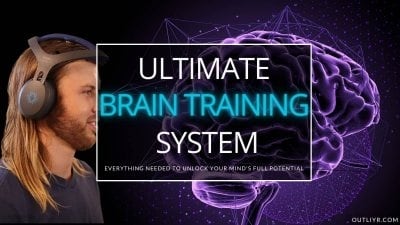
Is Sens.ai the ultimate 5-in-1 brain training headset? 300+ sessions later, I’ve thoroughly tested and reviewed this system to help you decide if it’s worth the price.
Product Price:
$1500
Product In-Stock:
InStock
Pros
- 5 brain training devices in 1
- Fast customer support
- Rugged carrying case
- Portable
- Highly accurate data
- Unlimited usage
- Rapid app & firmware updates
- Safe & powerful
- Integrous & generous brand
Cons
- Expensive
- Requires membership for full access
- Can’t access raw data
- Can take a while to establish a clean signal
- Some app glitches
- Headset shouldn’t be shared

